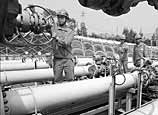
BERLIN, Jan. 21 (Xinhua) -- German Chancellor Angela Merkel had been hoping to get a boost for her efforts to continue her third term from a key state election in Lower Saxony on Sunday. The result, however, disappointed her.
With a lead of single seat in state parliament, opponents Social Democratic Party (SPD) and the Greens succeeded to oust the ruling coalition of Christian Democratic Union (CDU) and Free Democratic Party (FDP) in the German fourth most populous state.
Merkel's conservative CDU, led in Lower Saxony by rising political star and incumbent state Prime Minister David McAllister, earned 36.0 percent of votes. Its pro-business ally FDP in the state, the same as at federal level, got 9.9 percent.
SPD, led by mayor of Lower Saxony capital of Hanover Stephan Weil, claimed a support rate of 32.6 percent, while its partner the Greens had 13.7 percent.
In the 137 seats of the parliament, "red-green coalition" of SPD and the Greens gained 69 seats, "black-yellow coalition" of CDU and FDP got the rest 68. With his coalition holding a majority in state parliament, Weil could now replace McAllister as new state leader for the next five years.
Merkel was hoping CDU to continue its governance in the German industry and farming stronghold, home state of auto giant Volkswagen, and appeared almost daily in last-moment rallies of McAllister, a charismatic CDU politician expected to succeed Merkel after she released her power.
But the result late Sunday night was a blow to Ms. Chancellor, who is facing the same challenge from coalition of SPD and the Greens in a federal election in September.
Failed to retain a majority with its ally in Lower Saxony parliament, CDU will further lose strength in Bundesrat, upper house of German federal parliament representing the 16 states of Germany.
Merkel's government will face more hindrance in implementing its policies, such as the ambitious energy transitions, nationally, even though she continued her third term to lead the Europe's biggest economy.
For FDP, the result seemed like a turning point. In previous polls, the junior ally of CDU could hardly reached the 5 percent threshold to re-enter parliament, both in Lower Saxony and nationally.
It had been expected that if FDP failed to enter the state parliament, its leader, German Vice Chancellor and Economic Minister Philipp Roesler, might have to resign.
Some CDU politicians had called its own supporters to take advantage of German dual voting system to vote for FDP in their second ballots. McAllister, son of a Scottish soldier and a German music teacher, had also implicitly support the idea.
As a result, FDP earned almost 10 percent of votes on Sunday, twice as many as what it could get at most in previous polls. But it came at the expense of CDU, which suffered a loss of 6.5 points of support rate compared with in 2008, when it successfully form a ruling coalition with FDP for the second term in Lower Saxony.
It was a warning signal for Merkel, as she faces the same situation nationally. With a high support rate of 43 percent, her conservative party is runing far ahead of SPD, which got only 25 percent of support. But without FDP, CDU could not guarantee a majority in Bundestag, lower house of the federal parliament, which is needed to form a government.
The latest polls on Sunday by Emnid institute showed that FDP was supported by only 4 percent of voters in the whole country.
A transfusion may not work in federal election this fall, result in Lower Saxony indicated.
As an effort to win back supports, FDP on Monday announced that Rainer Bruederle, a reputable FDP politician and its parliament leader, would be its candidate for the upcoming federal election, while Roesler remained as the party leader. The two politicians will lead the FDP in election campaign "as a team", said Roesler in Berlin.
SPD is also making adjustment. After state election on Sunday, SPD candidate Peer Steinbrueck admitted that his gaffes were not helping his party in the campaign.
Image of the former Finance Minister during Merkel's first term has been damaged by his comments that German chancellor's salary was too low, Merkel's popularity was attributed to her gender and that he would not drink a wine cost less than 5 euros.
Previously, Steinbrueck's million-euro-making speeches also made trouble for the candidate of SPD, a party claimed to seek social fairness in Germany.
Compared with the support rate of 59 percent that Merkel enjoyed, only 18 percent of Germans would like Steinbrueck to be their Chancellor for the next four years.
The victory in Lower Saxony could be a boost for SPD. McAllister's experience in Lower Saxony showed that personal fascination didn't definitely equal to success of a party and a coalition.
SPD was expect to improve its momentum for campaign in the next eight months. That will give Merkel more pressure to retain her post and to avoid a similar thing in Lower Saxony from happening again.
















 This is the most real, most helpless and most motivate life expense of Beijing!
This is the most real, most helpless and most motivate life expense of Beijing!


![]()
